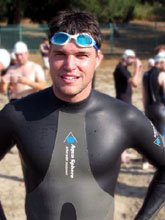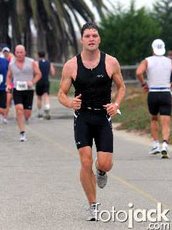 So there's this new thing called "science" that has a lot of people talking these days and I thought I'd spend a tip talking about it, just because, gosh, I'm thinking it might have some applicability to the fitness world.
So there's this new thing called "science" that has a lot of people talking these days and I thought I'd spend a tip talking about it, just because, gosh, I'm thinking it might have some applicability to the fitness world.As a personal trainer I am compelled to renew my certification every couple of years by attending continuing education classes. These classes usually take the drab, drone-y form of a remedial driving class: the lecturer either tells you things you've known for decades, or speaks with great vehemence about very questionable things, then concludes by asking you to pony up $49.99 for the Abdomulator. Not my favorite way to pass a weekend.
So a few weeks back, faced with a choice between acquiring some continuing ed. credits or getting pounded with a myofascial foam pad by the Internal Affairs Division of Personal Trainers, I attended a seminar held by a chap called Alan Aragon. Whatever the topic of discussion, I was at least intrigued at the prospect of seeing a fitness presentation led by a fire-breathing dragon.
 Aragon turned out to be far more interesting: his seminar was titled "Girth Control: The Science of Fat Loss & Muscle Gain," and in about 30 seconds I could tell that this guy was no Internet-guru quack, a type I've come down on pretty heavily in the past. Nope, Aragon's one smart cookie, and lucky for anyone he works with, he's also something that we don't see a lot of in the fitness world: a skeptic.
Aragon turned out to be far more interesting: his seminar was titled "Girth Control: The Science of Fat Loss & Muscle Gain," and in about 30 seconds I could tell that this guy was no Internet-guru quack, a type I've come down on pretty heavily in the past. Nope, Aragon's one smart cookie, and lucky for anyone he works with, he's also something that we don't see a lot of in the fitness world: a skeptic.If you've even skimmed a fitness book, sat through a late-night infomercial on weight loss, or glanced at an ad for any muscle gain powder or drink or system or piece of equipment, you'll know that the fitness world is chock-full of whackos whose zeal is almost religious: you've got your gurus, your crazy, hopped-up evangelist types like Bill Phillips, your sacraments in the form of protein powders and Omega-3 supplements, your holy scriptures with titles like Fitness is Religion and Body By God. We strap ourselves into medieval exercise machines and endure whatever pain and suffering they can mete out. Fat is the devil we must exorcise and scorch away; muscle is the shining Holy Grail, pursued with ever-redoubling conviction and fervor. Hallelujah! Praise the lats!
Amidst all the speaking in tongues, Alan Aragon is a fitness agnostic. He's -- what the hell, let’s just belabor the hell out of this analogy, shall we? -- he’s Galileo, insisting that the Catholic Church cede to the empirical evidence and admit that the Earth circles the sun.
Let's just hope that he never recants.
Basically, he's an advocate of applying this "science" thing in pursuit of optimal dieting and exercise techniques. So what's so novel about that?
Well, shockingly, the deluge of fitness advice that is regularly dumped on the public is almost never subjected to much scientific scrutiny. Rather like our current administration, fitness folks tend to just repeat things until everyone slowly decides that they must be true. And I'll admit that in the past I've been guilty of jumping on the trendy train, just because, well, I'm human too, and I get excited about new fitness information just like everyone else.
 Here's a great example: remember how we grew up thinking that you should drink 8-10 glasses of water a day? We must have heard that a hundred times growing up. Well, you know how many studies to prove that 8-10 glasses a day was optimal for most people?
Here's a great example: remember how we grew up thinking that you should drink 8-10 glasses of water a day? We must have heard that a hundred times growing up. Well, you know how many studies to prove that 8-10 glasses a day was optimal for most people?Zero. As you've probably heard by now, the 8-10 glasses of water a day thing was pretty much pulled out of thin air by a guy with a few letters after his name. He meant well -- someone asked him how much water he thought people should drink and he gave a good-faith estimate based on his experience -- but he never meant for us to parrot him for decades, his ball-park estimate posted on school-nurses' walls nationwide and reprinted in every issue of SELF since Cheryl Tiegs graced its cover.
 Remember the scene in Modern Times when Charlie Chapin finishes a long day of tightening lug nuts on an assembly line, and reels around with the lug-nut-tightening twitches, finally assaulting a poor woman with strategically-placed buttons on the front of her jacket? As consumers of fitness advice, we're a little like that. We hear that antioxidants and Omega-3 fats are good for us and we start swilling multivitamins by the fistful and flaxseed oil by the gallon. Meantime, we never bother to read the studies showing, rather convincingly, that too much of some antioxidants can cause stomach problems and too much Omega-3 fat can compromise immune functioning.
Remember the scene in Modern Times when Charlie Chapin finishes a long day of tightening lug nuts on an assembly line, and reels around with the lug-nut-tightening twitches, finally assaulting a poor woman with strategically-placed buttons on the front of her jacket? As consumers of fitness advice, we're a little like that. We hear that antioxidants and Omega-3 fats are good for us and we start swilling multivitamins by the fistful and flaxseed oil by the gallon. Meantime, we never bother to read the studies showing, rather convincingly, that too much of some antioxidants can cause stomach problems and too much Omega-3 fat can compromise immune functioning.Thank god for guys like Alan Aragon: he's out there poring over studies, sifting through them for faults, and revising recommendations as necessary. Aragon reads the fine print, and it usually says, in so many words, "The guys who did this study also stand to profit handsomely from its results." The low-carb industry has lost a little steam lately, but you can bet there are a few dozen aspiring Atkins heirs out there scrambling to get a headline in Men's Health about how women are chemically more drawn to men on low-carb diets than their flour-stuffed brethren.

 It's ironic -- and no surprise -- that I hadn't heard of Aragon before this seminar. As he pointed out in his talk, a book with "moderation" in the title most likely won't find its way to the bestseller list. No, we like our fitness tips extreme, absolute and universally applicable. Cut fat to lose weight. Cut carbs to lose weight. Eggs are bad. Eggs are the perfect food. Eat only vegetables. Eat only raw foods. Eat only grapefruits. Eat only meats. Eat no meats. Aerobic exercise is the second coming. Aerobic exercise is the scourge of the devil.
It's ironic -- and no surprise -- that I hadn't heard of Aragon before this seminar. As he pointed out in his talk, a book with "moderation" in the title most likely won't find its way to the bestseller list. No, we like our fitness tips extreme, absolute and universally applicable. Cut fat to lose weight. Cut carbs to lose weight. Eggs are bad. Eggs are the perfect food. Eat only vegetables. Eat only raw foods. Eat only grapefruits. Eat only meats. Eat no meats. Aerobic exercise is the second coming. Aerobic exercise is the scourge of the devil.With so much money to be made in the fitness industry, it's no wonder there are so many crackpots and snake-oil charlatans claiming to have found the Holy Grail. And some of the manufacturers of these products also happen to publish popular magazines covering the topic of fitness, and if an article in the magazine happens to cover a popular athlete and that athlete happens to use a given product also manufactured by the magazine's publisher, well, I'm no economist, but I'm sensing something of a threat to perfect and absolute journalistic objectivity here.
The antidote? Well, in a word, science. Guys like Alan Aragon make a living sifting through the detritus for useful nuggets of dietary advice, and have a wealth of expertise and experience and to help them do it. But everyone -- myself included -- can be a little more on their guard about blindly following the latest trends, and about taking every blurb on diet and fitness at face value. We can find out the source of the studies that fitness articles cite as evidence for their claims. Using the internet, we can often find the studies themselves and make up our minds for ourselves: does this study really prove what they say it proves? What might they have missed? What biases might be in play? Basically, we don't need to be fitness lemmings, following the carb-deprived crowd right over the cliff.
That was the most useful little nugget I got out of that weekend seminar. Think for yourself. Resist extremism. Use common sense. Moderation is key.
And, this "science" thing is useful.
Thanks, Alan.
Andrew




No comments:
Post a Comment